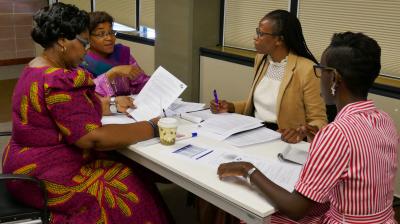News
The 8th edition of the African Women Mediation Programme (AWMP) had to take place in an online format. Nevertheless, it worked out excellent to maintain the highly interactive nature of the training with such a high level and motivated group of 25 women mediators. The director of the Clingendael Academy and negotiation expert Ron Ton was very pleased to have again been invited to deliver the training in negotiations and mediation skills. As in previous years, a wide variety of professional backgrounds were represented, for instance, local community leaders, police-, defence-and diplomatic staff, civil society groups and NGO’s from all over the African continent.
The programme was initiated by the MFA of South Africa (DIRCO) in 2013, in collaboration with Clingendael Academy, the Netherlands MFA and the African Union/FemWise. The AWMP is meant to support the initiative of increasing the number of highly qualified and trained women in African conflict resolution and peace negotiations.
Objective and takeaways
The overall objective is to give participants a better grip on negotiation processes from the perspective of a mediator. The training began with providing a solid foundation in strategic insights, methods, and tools. A competence-based approach gave the participants insights into their strongest competences and provided for a method to be used to stay in control of complex negotiations situations. This part of the seminar was followed by designing an individual negotiations profile for each participant. Exercises were included to practice on dealing with sensitive issues, values, and norms in conflict negotiations. A training on inclusivity was continued on the last day in a simulated exercise on pre-talks deciding who should be represented behind the negotiation table.
The final session held was a discussion on how to promote the women’s voice in peace talks, discussing root causes and actions plans. Some takeaways were to have a better linkage between the local, grassroots, regional and interstate level, increasing the opportunities to develop a professional track record through training, job shadowing and mentoring, better coordination among women interest groups, better understand the barriers that limit women participation within specific cultural contexts and ensuring clear selection procedures for mediators.




